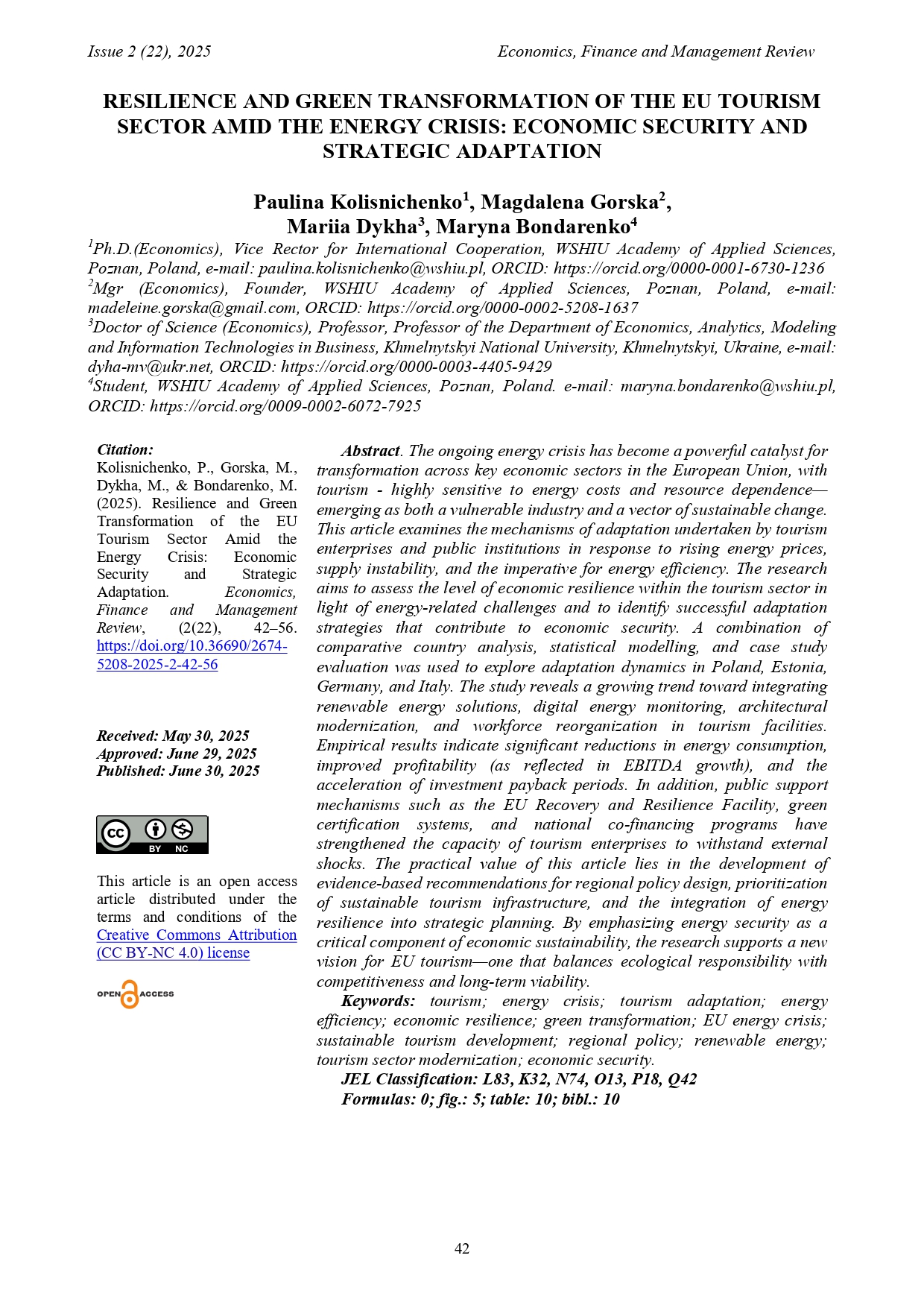RESILIENCE AND GREEN TRANSFORMATION OF THE EU TOURISM SECTOR AMID THE ENERGY CRISIS: ECONOMIC SECURITY AND STRATEGIC ADAPTATION
DOI:
https://doi.org/10.36690/2674-5208-2025-2-42-56Keywords:
tourism, energy crisis, tourism adaptation, energy efficiency, economic resilience, green transformation, EU energy crisis, sustainable tourism development, regional policy, renewable energy, tourism sector modernization, economic securityAbstract
The ongoing energy crisis has become a powerful catalyst for transformation across key economic sectors in the European Union, with tourism - highly sensitive to energy costs and resource dependence—emerging as both a vulnerable industry and a vector of sustainable change. This article examines the mechanisms of adaptation undertaken by tourism enterprises and public institutions in response to rising energy prices, supply instability, and the imperative for energy efficiency. The research aims to assess the level of economic resilience within the tourism sector in light of energy-related challenges and to identify successful adaptation strategies that contribute to economic security. A combination of comparative country analysis, statistical modelling, and case study evaluation was used to explore adaptation dynamics in Poland, Estonia, Germany, and Italy. The study reveals a growing trend toward integrating renewable energy solutions, digital energy monitoring, architectural modernization, and workforce reorganization in tourism facilities. Empirical results indicate significant reductions in energy consumption, improved profitability (as reflected in EBITDA growth), and the acceleration of investment payback periods. In addition, public support mechanisms such as the EU Recovery and Resilience Facility, green certification systems, and national co-financing programs have strengthened the capacity of tourism enterprises to withstand external shocks. The practical value of this article lies in the development of evidence-based recommendations for regional policy design, prioritization of sustainable tourism infrastructure, and the integration of energy resilience into strategic planning. By emphasizing energy security as a critical component of economic sustainability, the research supports a new vision for EU tourism—one that balances ecological responsibility with competitiveness and long-term viability.
Downloads
References
European Commission. (2024). EU energy statistics 2024. Eurostat.
European Environment Agency (EEA). (2023). Energy efficiency and the environment in Europe 2023. EEA Report No 15/2023.
International Energy Agency (IEA). (2024). World Energy Outlook 2024. IEA Publishing.
Kowalski, P. (2021). Financial resilience of tourism enterprises under energy threats. Journal of Business Continuity, 7(2), 34–50.
Nowak, A., & Tamm, E. (2023). Digital energy monitoring in the hospitality sector: Case studies from Poland and Estonia. Sustainable Tourism Review, 8(1), 77–93.
OECD. (2023). Tourism and energy efficiency: Policy tools and practices. OECD Publishing.
Petrova, O. (2022). Вплив енергетичних викликів на туристичний сектор ЄС. Journal of European Tourism Studies, 15(3), 45–60.
Rossi, L., Bianchi, M., & Verdi, F. (2022). Sustainable development in Italian and German tourism policy. European Journal of Tourism Research, 14(1), 102–117.
Schmidt, H., & Kraus, T. (2023). Energy crisis and tourism: Economic impacts in Europe. Energy Policy Journal, 58(2), 120–138.
UNWTO. (2024). European tourism trends 2024. World Tourism Organization.

Downloads
Published
How to Cite
Issue
Section
License

This work is licensed under a Creative Commons Attribution-NonCommercial 4.0 International License.








